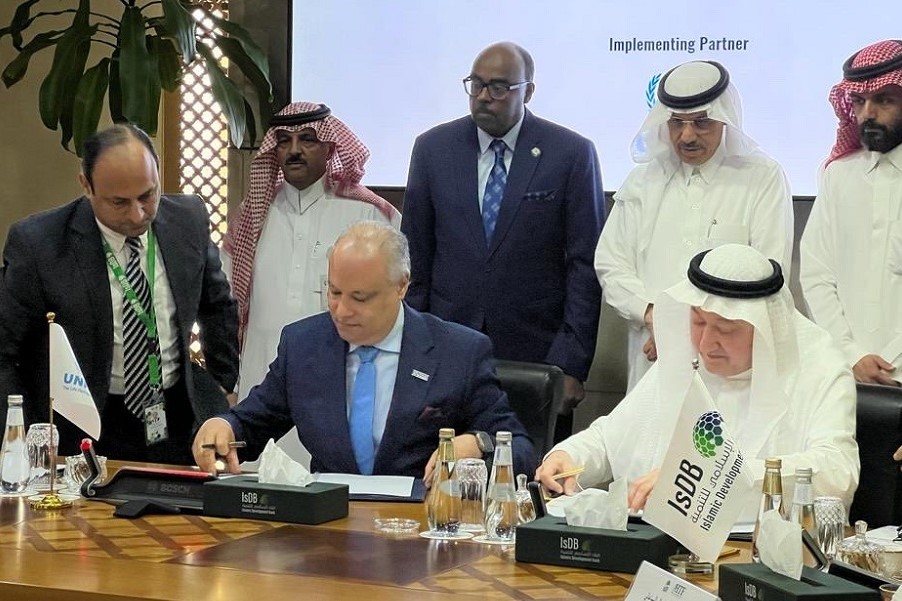
UNHCR and the Islamic Development Bank signed three agreements aimed at bolstering access to education, healthcare services, and livelihood opportunities in Afghanistan. Source: Ariana News
This week in Kazakhstan, President Tokayev and Prime Minister Smailov held a series of high-level meetings with members of the parliament in Kazakhstan’s lower house, the Majilis, to set the 2024 legislative session. Economic growth was the main topic of discussion, with emphasis on the development of small and medium enterprises, industrial development, and foreign investment. Intentions to pursue green energy and ‘greening’ of the economy were also discussed (Kazakhstan Today). These efforts tie in with a greater socioeconomic agenda for 2024 from the President. Under the 2024 legislative session, 35 bills related to the improvement of Kazakhstan’s socioeconomic situation, including bills that provide support for children, environmental regulations and consumer protection have been sent to the Senate for approval (Astana Times). These initiatives will be discussed in an expanded parliamentary session, which will be led by Tokayev in the coming weeks (Kazakhstan Newsline). Given the importance of these initiatives, socioeconomic development will likely be a major theme of Kazakhstan’s 2024 legislative agenda.
A series of earthquakes, measuring a magnitude of 4.6 to 4.9 struck Central Asia this week over the course of three days. These quakes impacted communities near Almaty the most over these days (KazInform; KazInform). For residents in Almaty, the big quake felt like “something […] had exploded,” temporarily disrupting life in the city (Tengri News). Elsewhere in Central Asia, quakes were observed, including a 3.0 earthquake on the Krygyzstani-Uzbekistan border, though given the remote location, these quakes had little impact on the citizens of both countries (AKI Press).
An official at Uzbekistan's Ministry of Investment, Industry and Trade was arrested this week after receiving fourteen thousand dollars from a Samarkand resident to help him illegally enter the United States. This high-profile arrest comes a month after several other citizens across Uzbekistan were arrested for attempting to smuggle Uzbekistanis to the United States (Tashkent Times). In this instance, the official claimed that he could leverage some of his connections at the Uzbekistani embassy in the United States to allow the Uzbekistani citizen to enter the country (KUN Uzbekistan). These arrests in Uzbekistan came about after 120 Uzbekistani citizens were detained in the U.S. after crossing the southern border illegally from Mexico and later deported (Gazeta Uzbekistan).
On his state visit to the United Arab Emirates, Turkmenistan’s former President Gurbanguly Berdimuhamedov, also titled the country’s National Leader, signed a series of bilateral agreements to enhance both countries' relations. These agreements include plans to explore and develop oil fields in Turkmenistan and cooperation agreements between both countries’ civil aviation organizations to increase the number of flights between Ashgabat and the UAE (Turkmen Portal). These agreements largely focus on “cooperation in a number of regions” across Turkmenistan and between state-owned Emirati and Turkmenistani oil companies and financial institutions (Turkmen Portal). The aviation agreements included the signing of a memorandum of understanding between Turkmenistan and FlyDubai, the country’s largest cargo hauler, to increase the volume of cargo transiting through Turkmenistan’s ports of entry (Turkmenistan Today).
Afghanistan is trying to increase investment from foreign and domestic actors to boost the country’s economy going into 2024. At the beginning of the year, Mawlavi Abdul Salam Hanafi, Deputy Prime Minister for Administrative Affairs courted representatives from Afghanistan’s largest merchants and business people to encourage investment into critical projects in the country. Outside of Afghanistan, Taliban officials signed memoranda of understanding with representatives of the UN Refugee Agency in Jeddah, Saudi Arabia, to develop vocational training programs for Afghanistanies in industries like craft making, beekeeping and other traditional vocations (Ariana News). Further, Zabihullah Mujahid, the spokesman of the Islamic Emirate, announced that long-awaited China-funded development programs, such as the building of a Trans-Afghan railway in the Wakhan Corridor, would soon begin construction. A further 45 projects, financed by the World Bank and left half-finished when the Ghani government fell, will continue construction this year (Tolo News).

